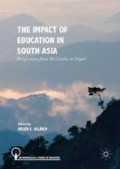Abstract
Since the end of the nineteenth century, Dalits (“Untouchables”) struggled for the right to public spaces, including temples, streets, water tanks, and education. What did education mean to Dalit men and especially to women? Why was it so important to women? How did women deal with double patriarchy: private and public, inside and outside their homes, and double discrimination—of caste and gender oppression? To examine these questions, my essay focuses on the life histories of three (Dalit) Matang, middle-class women from Pune, Maharashtra. I draw upon my book Dalit Women’s Education in Modern India: Double Discrimination to focus on education, caste and gender discrimination, Brahmani hegemony, new patriarchy, and employment after education in urban Pune.
Access this chapter
Tax calculation will be finalised at checkout
Purchases are for personal use only
References
Abbasayulu, Y.B. 1978. Scheduled Caste Elite: A Study of SC Elite in Andhra Pradesh, Hyderabad. Ph.D. dissertation, department of sociology, Osmania University, Hyderabad, India.
Ambedkar, B.R. 1991a. What Congress and Gandhi Have Done to the Untouchables. In Babasaheb Ambedkar Writings and Speeches, vol. 9. Bombay: Government of Maharashtra.
Ambedkar, B.R. 1991b. Did the Hindus Never Eat Beef? In Babasaheb Ambedkar Writings and Speeches, vol. 7: 323–328. Bombay: Government of Maharashtra.
Ambedkar, B.R. 1991c. What Made the Brahmins Become Vegetarians? In Babasaheb Ambedkar Writings and Speeches, vol. 7: 334–349.
Benei, Veronique. 2008. Schooling Passions: Nation, History and Language in Contemporary Western India. Stanford, CA: Stanford University Press.
Beteille, Andre. 1992. The Backward Castes in Contemporary India. Oxford: Delhi.
Bourdieu, Pierre, and Jean-Claude Passeron. 1977. Reproduction in Education, Society and Culture. Translated from the French by Richard Nice. London: Sage.
Census of India. 1991. Series 14, Maharashtra, Part VIII (1): SC-1: Distribution of SC Population by Sex for Each Caste, 66–67.
Chatterjee, S.K. 2000. Looking Ahead: Educational Development of Scheduled Castes. New Delhi: Gyan Publishing House.
Chitnis, M.B. 1973. An Educational, Social and Economic Survey of Milind College Students. In the Milind College Annual, Vol. X. Reprinted in 1986 Untouchable! Voices of the Dalit Liberation Movement, ed. Barbara Joshi, 47–49. London: Zed Books.
Chitnis, Suma. 1981. A Long Way to Go….: Report on a Survey of Scheduled Caste High School and College Students in Fifteen States of India. A Project Sponsored by ICSSR. New Delhi: Allied Publishers.
Dushkin, Lelah. 1972. Scheduled Caste Politics. In The Untouchables in Contemporary India, ed. Michael Mahar, 165–226. Tucson, AZ: The University of Arizona Press.
Dushkin, Lelah. 1979. Backward Class Benefits and Social Class in India, 1920–1970. Economic and Political Weekly, 7 April, 14 (14): 661–667.
Gramsci, Antonio. 1971. Selections from the Prison Notebooks of Antonio Gramsci, ed. Q. Hoare and G. Nowell Smith (trans. G. Nowell Smith). London: Lawrence and Wishart.
Illich, Ivan. 1971. Deschooling Society. New York: Harper and Row.
Jeffrey, Craig. 2008. Degrees without Freedom? Education, Masculinities and Unemployment in North India. Stanford, CA: Stanford University Press.
Kananaikil, Jose. 1998. Scheduled Castes and the Struggle Against Inequality. New Delhi: Indian Social Institute.
Kuchekar. 2002. Interview conducted by author.
Kurane, Anjali. 1999. Ethnic Identity and Social Mobility. Jaipur: Rawat Publications.
Malik, Suneila. 1979. Social Integration of the Scheduled Caste. New Delhi: Abhinav Publications.
Paik, Shailaja. 2009. Chhadi lage chham chham, vidya yeyi gham gham (The Harder the Stick Beats, the Faster the Flow of Knowledge): Dalit Women’s Struggle for Education. Indian Journal of Gender Studies 16 (2): 175–204.
Paik, Shailaja. 2011. Mahar-Dalit-Buddhist: The History and Politics of Naming in Maharashtra. Contributions to Indian Sociology 45 (2): 217–241.
Paik, Shailaja. 2014. Dalit Women’s Education in Modern India: Double Discrimination. London and New York: Routledge.
Paik, Shailaja. 2016. Forging a New Dalit Womanhood in Colonial Western India: Discourse on Modernity, Rights, Education, and Emancipation. Journal of Women’s History 28 (4): 14–40.
Paik, Shailaja. 2017. Mangala Bansode and the Social Life of Tamasha: Caste, Sexuality, and Discrimination in Modern Maharashtra. Biography 40 (1): 170–198.
Pawar and Pawar. 2004. Interview conducted by author in Mumbai.
Sachidananda. 1976. The Harijan Elite. London: Thompson Press.
Shukla, Sureshchandra, and Rekha Kaul (eds.). 1998. Education Development and Under-Development. New Delhi: Sage.
Singh, Anant Santokh. 1969. The Changing Concept of Caste in India. New Delhi: Vikas Publications.
Vasi, Nazia. 2007. How the Chinese Learn English. Times of India, 25 March 2017.
Velaskar, Padma. 1998. Ideology, Education and the Political Struggle for Liberation: Change and Challenge Among the Dalits of Maharashtra. In Education, Development and Under-Development, ed. S. Shukla and R. Kaul, 210–240. New Delhi: Sage.
Wagh, Vilas. 1986. Sugava Special Deepavali Issue. Pune: Sugava (November–December).
Wagh, Vilas. 1994. Ambedkari Prerana Visheshank (Ambedkar Inspired Special Issue). Pune: Sugava.
Waghmare. 2004. Interview conducted by author.
Wankhede, G.G. 2001. Educational Inequalities Among Scheduled Castes in Maharashtra. Economic and Political Weekly, 5–11 May, 36 (18): 1553–1558.
Author information
Authors and Affiliations
Corresponding author
Editor information
Editors and Affiliations
Rights and permissions
Copyright information
© 2019 The Author(s)
About this chapter
Cite this chapter
Paik, S. (2019). Refashioning Futures: Dalit Women’s Education and Empowerment in Maharashtra. In: Ullrich, H. (eds) The Impact of Education in South Asia. Anthropological Studies of Education. Palgrave Macmillan, Cham. https://doi.org/10.1007/978-3-319-96607-6_6
Download citation
DOI: https://doi.org/10.1007/978-3-319-96607-6_6
Published:
Publisher Name: Palgrave Macmillan, Cham
Print ISBN: 978-3-319-96606-9
Online ISBN: 978-3-319-96607-6
eBook Packages: Social SciencesSocial Sciences (R0)

